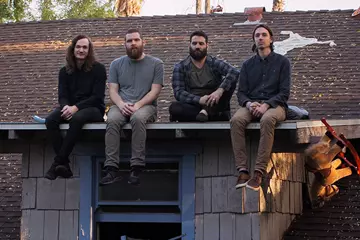
All About Women is one of the best days of the year on Sydney's cultural calendar: FACT. There's something endlessly inspiring about being surrounded by motivated, socially conscious, creative women (more than 11,000 of them!), all set against a backdrop of y'know, the Harbour Bridge. We're very very lucky.
The day begins with Miranda July's Lost Child!, an hour-and-a-half talk from the seminal filmmaker, writer and performance artist, about her career trajectory: "walking away from safety into darkness and surviving discomfort". She speaks to the idea of the intoxicating feeling of someone focusing on you (someone aside from your family and friends), whether that be her son, or her husband, and the idea that in that moment something shifts — nothing will ever be the same, thus creating a breeding ground for art. We are inspired by her DIY punk ethic — having an idea and then doing something about it right then and there, being in "perpetual motion", being able to make and learn from mistakes — and we too want to be making things and sharing them for the rest of our lives.
These tidbits of wisdom guide us through her story of her career, from dropping out of college to be in love, to performing her work between bands at punk shows "which was confusing to people", to the themes of her work: "I felt I was fighting every day to be able to do what I wanted to do... to be free." She made a space for herself, and then did what she could to keep that space her own, and not become "known and boring", branching out across mediums and subject matter, interrogating the role of the author, creating something shareable, present. At the same time, July was able to dispense with 'shame', the shame which makes it "easier to be paralysed", and instead to just feel tender about mishaps and mistakes and troubles because they're all moments in our lives. We complete a spoken word sort of exercise as All Of The Women In The World, and we end with a strange, intimate moment with a stranger.
Featuring the likes of Masha Gessen, Mallory Ortberg and Crystal Lameman, What Needs To Change was an open discussion on what perceptions of women and men need to change in society. With quite a lot of talk around intersectional feminism (the intersection of different structures of oppression, eg classism, racism, sexism, homophobia), the speakers brought to light that "white feminism excludes a lot of different types of women", and that, to some, feminism is "about white women getting on the same level as white men". When women in the US quote that their sex is being paid 78 cents to the dollar, these statistics often exclude women and men of colour.
Don't miss a beat with our FREE daily newsletter
Russian/American journalist and activist Masha Green spoke of her being the primary breadwinner in her household, which extended to a male nanny, an ex and current partner, a child, two refugees and their child. Crystal Lameman spoke of the power women have started to take on in her own community and how she was raised differently as an Indigenous woman. This became somewhat of a recurring theme within the talk, with one follow-up question from the audience acknowledging the traditional owners of the land, and asking the speakers why there were no more women of colour representing the panel.
We catch Piper Kerman speaking to Orange Is The New Black — yes, that is her memoir, and she is who the Netflix series is based on. The talk is overtly political, as she speaks to the inequality that leads to mass incarceration both in the United States and closer to our home, as well as the small ways in which she learnt to survive her time in prison. She speaks to the mental, emotional and physical conditions of confinement, and the reasons why we choose to incarcerate people and what really happens to them. The talk is also peppered with statistics: one in three women locked up across the globe are locked up in America; there has been a 650% increase in the incarceration of women in the US — occurring in conjunction with an increasing commitment to harsh punishment of behaviours that are not violent (women are punished more harshly than men for the same crimes); in Australia Indigenous women account for less than 3% of the population but half of the amount of women in prison. What is most illuminating is the stories about other women — that marginalisation and abuse creates/perpetuates cycles and systems of oppression and violence, and that only by creating support networks and bringing victimised people — 90% of people in prison have been the victims of crime — into the community can these systems be healed. She says we need to take apart disparities, including the differences in sentencing according to a defendant's race or socioeconomic status, and address issues of marginalisation that occur before women walk through prison gates — including those related to gender, race, homophobia, mental illness and substance abuse.
Kerman finishes on the note of empathy, asking that women in jail "be judged on their best day and the things they're capable of — not just on their worst day". She advises us to always seek common ground: "It's our connections to other people that help us through our greatest challenges.
"Inequality becomes intolerable when you allow yourself to be truly connected to others."
Then we finish our day sipping cosmos down by the Playhouse with Brian Lobel, a London-based performance artist. His work is titled You Have To Forgive Me, You Have To Forgive Me, You Have To Forgive Me, a loving look at Sex And The City and its continuing relevance to people's dating and professional lives today. We fill out a 94-question survey, adapted from the Carrie Bradshaw's questions at the start of Sex And The City episodes: "Can you be friends with an ex?"; "Can you forgive if you can never forget?" It's more than a little revealing, but the cosmo makes us feel a little more honest with ourselves than we might normally be — that questionnaire then becomes the basis from which Lobel, your Sex And The City guru, sits you down for an honest group chat, to tell you exactly which episode you need to watch. We learn something today about ourselves and our love life, and we have a good laugh as well.
We return to the Opera House after dark to catch Sleater-Kinney's headline set.















